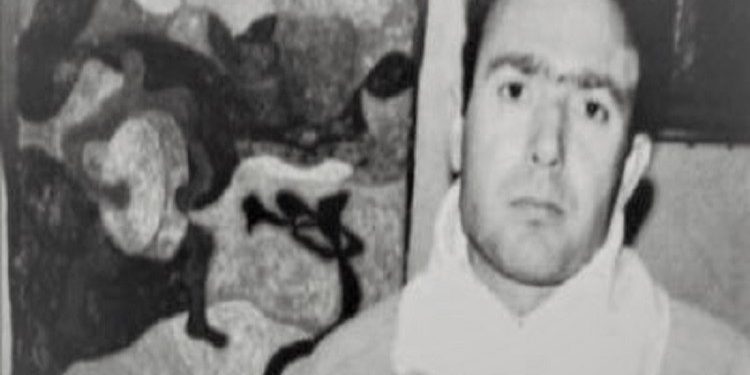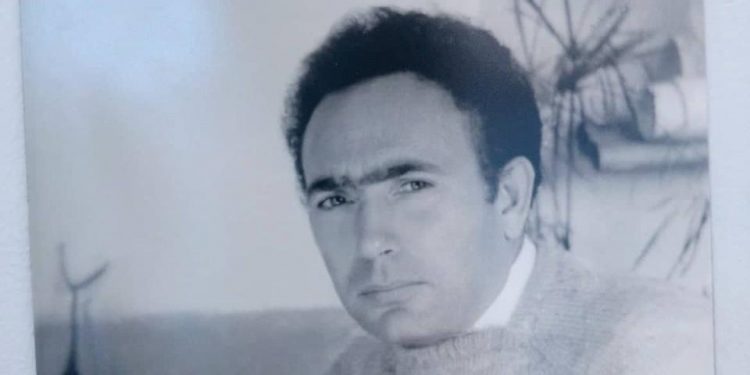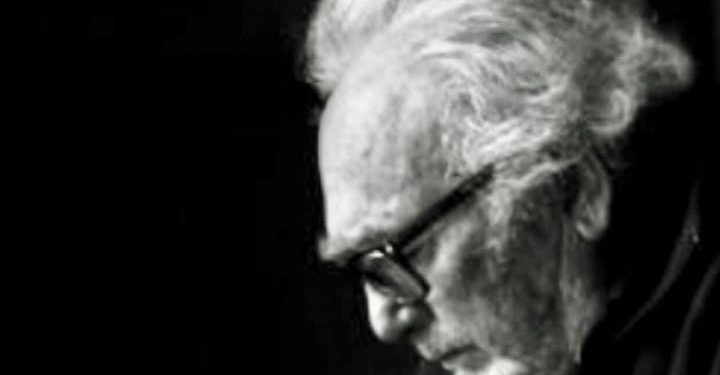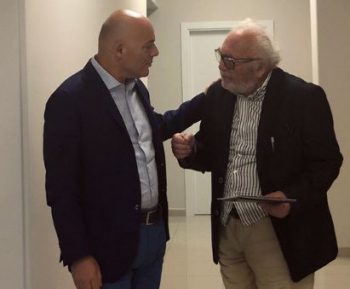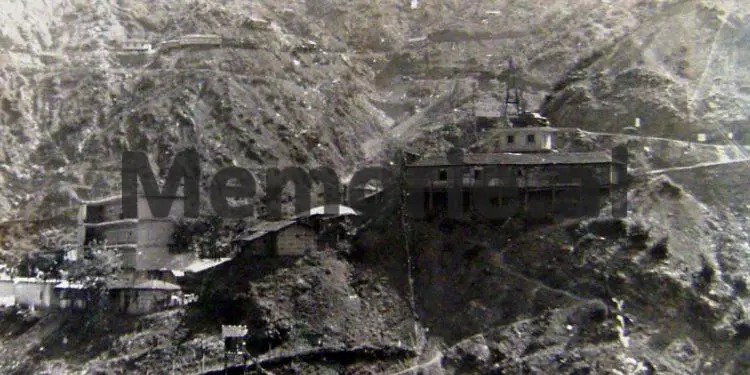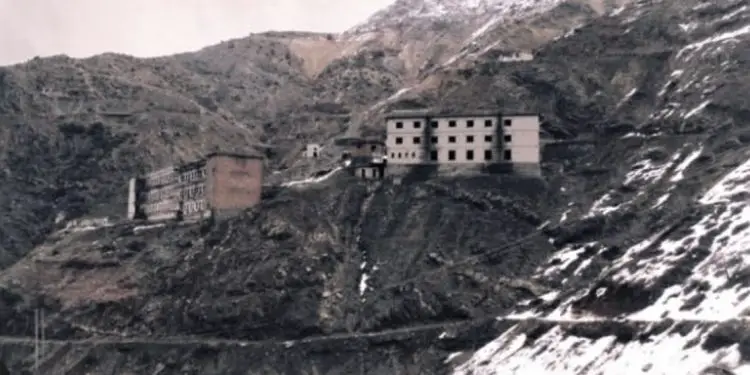From Blendi Fevziu
The first part
Memorie.al / Well-known painter, publicist, researcher and architect Maks Velo, in an interview with Blendi Fevziu on his weekly TV Klan show, “Opinion”, tells everything about his life. Architect, painter, writer, researcher, Velo stops from coming to life in Paris, the wave of persecution by the State Security and the arrest, until the wonderful collection of a thousand works that he has.
Architect, painter, writer? What would be the best definition I could use for you?
I have not done these things, in the sense, neither for falsity nor for wealth. I can’t share them. I have spent an activity as a researcher, I have many publications, I have many articles, I have about 20 articles only on folk art.
Mr. Velo, you were born in Paris, to an American mother, but a Dardhar to the core. A very strange mix…?
There were 22 iconographic painters in Dardha and they had a studio on Mount Athos in Greece. One of my ancestors was one of these iconographic priests. My grandfather, on my father’s side, had a sawmill in Ioannina, they cut bodies and sold them in the city. My father studied in “Zosimea” and then in Athens, graduated from the University of Medicine and returned.
Now let’s take my mother’s grandfather. In 1900, the first emigrants from Korça fled to America. It was Koli Kristofori, who is the first Albanian to touch the American soil, together with 17 others and after them, they also went from the villages, and the grandfather from the mother’s side was the first. Mom was born in Boston and came to Dardha as a girl to spend some time.
Pears who were heading towards America, without having any information about it, I believe…?
Yes, of course, as long as it was the first group. My father worked as a doctor in Korça, and at the time of Zog, the Directorate of Health, there was no ophthalmologist in Albania. So they took him to Paris, for specialization. At this time comes Dr. Christidhi from Manastir. However, father did his specialization in Paris and I was born while he was doing his specialization, so the other brother was too.
And then, did your father live in Tirana, or in Dardha?
No. When we returned from France, we returned to Korça, again, and he was a doctor in the hospital of Korçë. We spent all those years in Korça, the Italian occupation, the war.
Do you remember anything from that time?
Yes of course. I even had photographs, which were taken out in court, when I was little, with the Italians.
And why was this photo valid in court?
To tell me that I was a fascist…!
How old were you at that time?
I was 4 years old then.
How was Korça, that you remember in your early youth?
In fact, Korça was a city with some important, inherited values. That is, all religious holidays were very important there.
Was there a grudge between Muslims and Orthodox?
To be precise, it wasn’t the problem of whether there was a grudge, but that there was a pronounced dislevel. From the river and from the other side, you could see the difference in the way of life. Then it was a very good bazaar, very beautiful, very lively, with all the crafts, there were inns, there were six inns.
What was Korça like in those years?
Korça in those years was a city with a very bourgeois life, with “Korçë” Beer, “Kursalin” Cafe, with the concerts that were given.
Was there “Kursal” in Korça as well?
Yes, there was.
Does the word “Cursal” have any meaning?
It must be some name of coffee, where these people went out to Athens or Rome and brought it. Then, two cinemas, “Magjestiku” and “Luksi” were important. “Luksi” burned down and “Majestik” remained, which I regret was transformed into a sauna. We used to watch movies there.
What was the impetus that led you to study architecture?
First, that’s where the institutes were born. The Pedagogical Departments were opened in 1947-’48 and then they were opened with the help of the Russians: Agriculture, Medicine and Engineering, these three. Since I was out, I couldn’t go.
Why couldn’t you go outside?
I couldn’t go, because it was the work of the biography.
What was your problem with the biography, your father was a doctor?
Yes, but he was a doctor who had been convicted twice. Once, Petrit Dume, with the Kolonje squads, and once that he had taken the medicines he had bought and put them in the pantry. He did not hand them over and they confiscated them, and they also sentenced him. In other words, he was a non-Party man, he was withdrawn, they took him to Maliq, Këlcyre, Burrel, they barely brought him back, so he was not seen with good eyes.
Why did you choose architecture?
The first one was not architecture, but it was the Polytechnic Institute, it was Civil Engineering and some of us, who were better, me and Petraq Kolevica, in our course and others, specialized in architecture.
Did you, personally, have any passion for it?
Of course I had, because I drew, drew since I was little. In fact, I was still a student when I made the first exhibition in the corridors of the “Qemal Stafa” gymnasium, which is now. There, in the corridors, I did the works that I exhibited in Berat, Gjirokastër, Saranda, going there. So, it was the first time that a student exhibited something, and then the next exhibition, I did at the Tora of Durres, because they took me to Durres and there I restored the Tora. Then I did it in Tirana.
You said that it was very difficult for you to go to school abroad, because of your biography. Did you think that dealing with art, with the biography you had, you could have more problems?
You know me well and I am a man of passion. I don’t have much logic, in the sense of choosing these things. I did everything with passion, I didn’t even do it for profit, for positions, for grades, etc. So, I was driven by passion towards everything and burned with passion.
How did you burn with passion?
I was burned, because I went to Spaç, it’s almost like that hell of a doghouse.
Have you ever learned why you went to Spaç, there are many people who expressed today that they don’t know the real reason, why they were imprisoned…?!
As I told you, I have always acted with instinct and since 1964, I have the first abstract drawings that I have, they were saved, some I had in France, and I took them in 1992.
How does it start in France?
I started with a French professor who taught Foreign Languages.
Was this possible at the time?
Now, I went there and met him in the yard. That much was possible and I started and received them in ’92.
Almost 20 years are waiting for you…?!
Yes. So, I dealt with abstract art and I dealt with the analysis of primitive Albanian art, because it seemed to me the thing, where I could get something. That is, ethnography, worked stones, kilns, woodcutters, songs, etc.
You also had a collection, I don’t know if you still have it?
I have a few, I have a few things and I gave them to the folk sculpture collection. So everything that was primitive in Albania, I was also attracted by this extraction, and these, if you see them now, are not only primitive figures, coming from a distant source. This made me freeze and consolidate since ’64. I always stood out and some of these artists, with special assignments, knew exactly what I had in my drawer. Actually, when I was arrested…!
They knew exactly what you had in your house?
Yes, all things.
Insurance?
Yes.
So you have been in constant pursuit, even by relatives?
Constantly, because it was all the conversations, all the things, it was 10 years, 15 years. Since the 60s.
And where were you arrested?
In 1978, on October 14.
So for 18 years, roughly, you’ve been in pursuit. Did you feel this pursuit, this threat?
I felt the persecution, but one always has a hope that this is in vain, that they will understand that I have nothing wrong, that I really had nothing wrong. I worked a lot and it’s part of the job and there’s no way, the first. The second, that I didn’t do these things under compulsion, I didn’t hang them on the walls, I had them at home, there was nothing.
But then it precipitated…! If you see the latest materials of the meetings of the Political Bureau of the Central Committee of the PPSH, they are terrible, they are monster people and you see them in turn, how they accuse and then arrest those who are accused.
What was the threat that you brought to the Albanian society?
The threat was this: Our society has had a dose of evil, and it has, to a very large extent.
Does he still have it?
He still has it. On a very large scale, a core of evil.
At that time there was more?
He had more!
Where does it appear?
Because then you could do this, now you can’t do it as much.
Where does this wickedness appear?
I have faced this with my colleagues. I have some drawings from ’64, which are important, not only to me, but to the history of our painting, and no one comes to buy them in the gallery. You can’t buy anything from them and they know it, that’s the evil. In addition to spying on me, 13 artists appeared there, accusing me with the hall full. My trial was the only trial with artists that was held in public. Neither Mihallaq Luarasi, nor Edison Gjergo, all of them, no one has been tried in public. The trials were held in a room. But my trial in Tirana was held in public with invitations.
You were arrested on November 14, 1978. Where were you at the time of your arrest?
I left the house, I was going to the sidewalk, to Demner’s sidewalk, where the gambling house is now, the investigator, Dhimitër Shkodrani, called me from behind and they took me.
Did you think, from the first moment, that you were going to be arrested?
Yes, yes, I knew.
And where were they taken?
Directly in the cell.
How long were you in the cell?
Six months. Until April 1979, when the trial took place.
These six months in the cell, were you alone or with other people?
I was only five months old, when the file was closed, then two people entered me. A pilot who was likely to have an accident with a plane and Gjergj Peçin.
What was the charge?
The accusations, they formulated in a way that you would be hit, that if you had anything there, you would hang yourself in the moment. It was very heavy.
What was the concrete accusation they made against you?
It was concrete; “against the Party line, against the art of socialist realism, degenerate, socially harmful”.
Did you accept these charges?
I did not accept them in any court. I mean, that hall was full.
On what date were you brought to court?
On April 16, 1979, six months after the arrest.
Can you tell me how it started?
The trial was held in the court on “Rruga e Durrës”, on the upper floor, and was by invitation. Mom came, but they didn’t let her in. They only allowed it when the verdict was given. During the entire session, they did not allow it. There were 13 witnesses.
Who were these?
Most were artists.
Your friends, right?
All my friends. I even had two students, I had taught them. I even contradicted them as much as I could. The scene was one of the most absurd. The prosecutor said – “Van Gong”, and I said to him: “Mr. Prosecutor, it is not said that way, but Van Gogh”. He said to me, putting a wooden head of Gelardo on the table: “This is what the accused has done”.
I used to tell him: “This is not my work, but that of the folk craftsman.” – “You taught him to do it like this”?! he continued. – “There is no way I can teach him, because he doesn’t listen, even if I teach him.” In a word, ridiculous, absurd scenes. They held up my drawings, which were about 100 works, which they showed to the hall and what I will never forget, the decision was given and the whole hall applauded with ovation.
Was this a common thing back then…?
Common thing, yes, but a very mean thing.
Do you still remember this applause?
Always, whenever I come across all the artists, they are all fake.
How are they all fake?
They are fake, they are worthless people.
Have you been shot since you got out of prison to face any of those people who accused you?
Yes, I have faced. For example, with a witness who was Dhimitër Trebicka, the former director of the Art Gallery, and he told me; “Maxi, I,” he said, “wasn’t well in my head.” I told him, if you were the director, you would be fine, if you were not mentally sound, you would not be the director of the Gallery. What about you as a director, you were fine and to issue evidence against me, you were not fine?!
Have you ever felt the urge to take revenge, in one way or another, on them?
I have this desire, that everyone knows who they are, what they said.
What were their charges, more or less?
These accusations were…: “Maxi spoke to us in class about modern art. This man is degenerate, he protects the West, look at the affairs. This makes Albanian women nude”.
Were you really nude?
I had done it there at the Institute, at the Academy. It was the model who was posing and when she had posed for the students, I had also done it, I had not done anything else but that. Yes, the problem was that they said about me; “This was against Albanian women, against emancipation. It is with China, with the Soviet Union, with America”.
To read the nonsense of the expertise, made by Kujtim Buza, Foto Stamo e, Skënder Milori, are… that once in Minneapolis, Minnesota, I gave to the president of the Union of Journalists of Minneapolis. We were at a barbeque and I gave him to read the court decision and he told me that this is not possible, you did it yourself. He couldn’t believe it…!
How many years were you sentenced to these?
The maximum with this article is 10 years in prison, and I want to tell you that in Bulgaria, at this time, the agitation-propaganda article was 2-3 years. In our case, it was 3 to 10 and there were 30 convicts. I read the latter in “Ylli i Dritës”, a study by a Bulgarian academic.
How many years did you spend in prison?
I spent 8 years in prison in Spaç.
At the time of your arrest, was your collection damaged?
Yes, yes, of course. They went barbarously. It was Kujtim Buza, the one who made the selection, as I said. That is, they didn’t take all of them, they took those that were hostile. They took a whole truck, a “Zis” truck, that I had in front of the investigator, and every time I went there, I saw my work thrown away. My whole life was thrown away and then by court decision, they were burned.
You were sorry to see them, although in those conditions, when their lives were threatened, that was a lesser pain?
However, you are sorry, because what you have loved and worked for is reduced by seeing it muddied. They burned all these works.
So from your collection, of those modern works of that time, nothing is left?
No, they burned them. Some escaped. There was one in front of the office for the storage of these confiscated items: it was the Bailiff’s office and a bailiff, he knew the lady who worked there, Ruko Sako, and, as he told me, after work, when he was done, one of them, he put her in bag.
And then return them?
He gave me back the halves.
What was life like in Albanian prisons at that time? You were in prison from 1978 to 1986?
There is always a relationship between normal life, outside, and prison. This report appears in all forms, with the building, with the rules, with the food, with the living, with magazines.
I read in one of your books, after the 90s, where you said that; the happiest moment was the morning call. How can one have pleasure, from the appeal of the morning?
Now I have to specify that there were two appeals during the day, because it was a large terrace, which Shkelqim Bumçi had done this and on which we were not allowed to ride during the day, only during the appeal. But the appeal lasted until the people gathered, they were sought.
How many people were in Spaç during that time?
When I came, there were 800, when I left there, there were almost 1300. Spaçi has reached a maximum of 1380 people.
1400 people and how many square meters?
There were only two buildings and we ended up in a room of 52 people.
What size room?
On 3 floors the room was 10 meters, with 4 and we were reduced, up to 80 centimeters wide, up to 60 centimeters, which reached the bottom.
What were the other people who were in a room with you?
Now it is not good to ask me these questions, because I have said them and created some reaction. That is, the problem is that, this addition they made, they made it in a very justified way and it gives results until today. Memorie.al
The next issue follows




